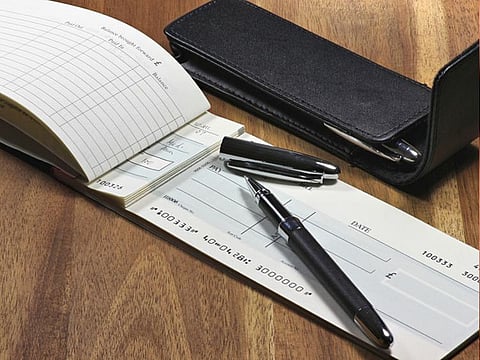Tenant rights in Dubai: Can your landlord increase rent for refusing fewer cheques?
Legal experts explain your rights from forced cheque reductions to unfair rent hikes

Dubai: If you are a tenant currently negotiating your tenancy contract renewal and your landlord is pressuring you to reduce the number of rent cheques, you may be wondering what your rights are. Some landlords may even attempt to retaliate by increasing the rent, despite it being against Dubai’s rental index regulations. Should you give in to this pressure?
A Gulf News reader faced a similar dilemma and sought advice on their rights as a tenant in Dubai:
“I’d like to know what a tenant’s rights are if a landlord asks to reduce the number of rent cheques from four to one. If the tenant refuses, can the landlord evict them? Additionally, if the tenant declines but the landlord agrees to keep it at four cheques but increases the rent—despite RERA regulations stating they can’t—what rights does the tenant have? We faced this situation last year and ended up paying extra to maintain four cheques, even though RERA stated the landlord couldn’t increase the rent.”
Dubai's rental laws provide clear guidelines on rent cheque payments and tenant rights during such disputes. If you are facing pressure to reduce the number of cheques during an active contract, here’s what you need to know.
Is it legal for a landlord to reduce the number of rent cheques?
Legal experts confirm that under Dubai Law No. 33 of 2008, any change to a tenancy contract requires mutual consent between the landlord and tenant.
“No, the landlord does not have the right to unilaterally reduce the number of rent cheques. This would constitute a change to the contract, which requires the consent of all parties,” explained Ludmila Yamalova, founder and managing partner of HPL Yamalova and Plewka DMCC.
Can a tenant be evicted for refusing to reduce the number of cheques?
Yamalova emphasised that a tenant cannot be evicted for refusing to agree to a change in payment terms. Dubai's rental laws outline specific and limited grounds for eviction, even when a tenancy agreement ends.
“This is particularly true in Dubai, where rental laws set out very specific and limited grounds for eviction, even at the end of a tenancy agreement. Tenancy agreements in Dubai automatically renew on the same terms and conditions, unless both parties agree otherwise. In this case, the landlord is attempting to breach the contract, while the tenant is simply asserting their legal right to maintain the existing terms,” she explained.
No, the landlord does not have the right to unilaterally reduce the number of rent cheques. This would constitute a change to the contract, which requires the consent of all parties.

What if the landlord tries to increase the rent?
Attempting to increase the rent without mutual consent is another form of contract change that is legally restricted. Yamalova clarified that if a tenant rejects a proposed rent increase, the landlord has no legal grounds to evict them.
“This means that the landlord is obligated to renew the contract on the same terms and conditions. If the landlord refuses to renew the contract, the tenant can file a case with the Rental Disputes Center (RDC) requesting contract renewal. Such cases are typically straightforward and resolved quickly. Since, in this example, the landlord lacks legal grounds to either evict the tenant or change the contract terms unilaterally, the RDC is likely to rule in favor of the tenant and order renewal on the original terms,” she said.
Also Read: UAE: Challenging a rent increase? Know your rights under Dubai's updated rental evaluation system
How are tenants protected in Dubai's rental market?
Dubai’s rental laws are designed to ensure fairness, offering tenants strong protections against unjustified contract changes or rent hikes.
“The Dubai rental law functions as a form of rent control, striking a fair balance between protecting tenants’ rights and investors’ interests. However, it does lean toward protecting the tenant, as the weaker party. This means that tenants’ rights are well-protected under the law. And the Rental Disputes Center (RDC) provides a specialized and efficient forum for resolving tenancy disputes quickly and affordably. Tenants should not be afraid to file a case with the RDC to protect their rights,” she said.
What does Dubai’s rental law say about changing contract terms?
Dr. Hassan Elhais, legal consultant at Awatif Mohammad Shoqi Advocates and Legal Consultancy, highlighted that as per Article 13 of Dubai Law No. 33 of 2008, any changes to a tenancy contract must have mutual consent from both the landlord and tenant. “If the current rent was paid in four cheques, the landlord cannot unilaterally reduce it to one cheque. Likewise, the landlord cannot increase the rent without the tenant’s agreement,” Dr. Elhais explained.
He also noted two key requirements for changing contract terms:
Proper notice: Under Article 14, landlords must provide 90 days' notice before the tenancy expires to propose changes.
Mutual agreement: If both parties disagree on changes, the RDC will decide based on the case's merits.
What steps can a tenant take if the landlord insists on changes?
Dr. Elhais advised tenants to utilise the RDC’s 'offer and deposit' petition, which allows them to deposit rent payments according to the original contract terms.
“As the tenant is under an obligation to pay his rent on time to avoid eviction resulting from non-payment of rent, and in case the landlord’s revised renewal terms are not agreeable to the tenant, the tenant may submit an offer and deposit petition with disputes centre and deposit his rent checks. The tenant has the right to request the RDC to renew the tenancy contract with the same terms, and the landlord has the right to request amendment to the terms such as the rent or payment terms,” he said.
As the tenant is under an obligation to pay his rent on time to avoid eviction resulting from non-payment of rent, and in case the landlord’s revised renewal terms are not agreeable to the tenant, the tenant may submit an offer and deposit petition with the RDC and deposit his rent checks.

How does the RDC decide rent disputes?
When handling disputes over rent increases, Article 9, Clause 1 of the rental law outlines factors the RDC will consider, including:
The RERA-prescribed rent increase percentage.
The prevailing economic situation in Dubai.
The condition of the property.
The rental value of comparable properties in the same area.
Other relevant factors deemed appropriate by the RDC.
Sign up for the Daily Briefing
Get the latest news and updates straight to your inbox


